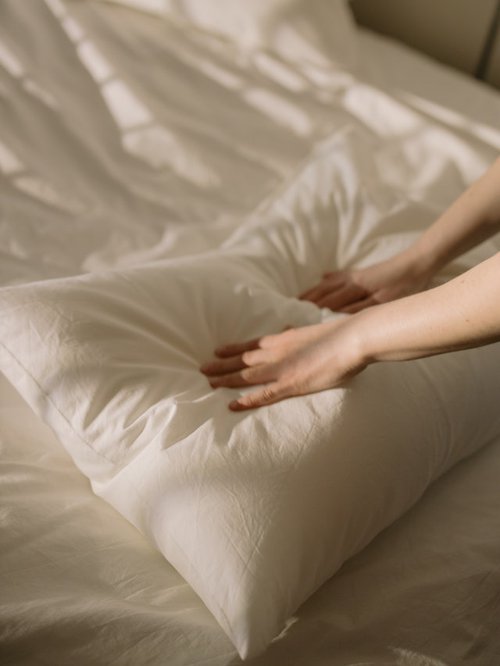DROPPING - JANUARY 2021
Augustinus Bader -
‘The Cream’
Join our waiting list to be one of the first to get your hands on this beautiful product
Your Bag
Already have an account! Sign In
Back to Log In
Get your mind out of the gutter, it's not what you think. Gorgeous, glowing skin wasn’t born overnight – or was it? Did you know that your quality of sleep could seriously impact your skin? Believe it or not, but priortising sleep may be all you need to do to restore your glow, make acne disappear and look younger by the day.
A 2017 study actually found that two days of sleep restriction negatively affected participant’s perceived attractiveness, health, sleepiness, and trustworthiness. We sure as hell don’t have time for that nonsense. Research has even shown that a single night of poor sleep can result in hanging eyelids, paler skin, darker undereye circles (this one we already knew), swollen eyes, more wrinkles and fine lines, as well as more droopy corners of the mouth. So, as we were saying – it’s time to get to bed.
The thing is, roughly 60 percent of adults get just 6.9 hours each night and report feeling tired most of the time. What’s worse than that, 30 percent of people function on fewer than six hours of nightly rest, and that short amount of time is hardly enough to give your body and mind enough time to hit refresh, let alone enough time for your skin to repair itself.
Beauty rest is real and Dr. Anna Persaud, PhD, sleep expert and CEO of ThisWorks, a beauty and wellness product brand, agrees. “Overnight, skin goes into repair and restore mode, meaning it removes toxins, repairs cell and DNA damage caused by the environment, replaces aging cells, and creates new ones. That’s why after good-quality sleep, skin looks fresher, younger, and more radiant.”
Maximise the time you spend catching Zs by following these steps:
It’s imperative to develop a skin-care routine that focuses on moisturising and regenerating skin. These aspects are integral to helping slow the signs of ageing, says Persaud. Hyaluronic acid, she says, “helps to bind water to skin cells.” Translation: This ingredient is the key to attaining a dewy, healthy glow.
Early studies suggest vitamin C’s antioxidant properties may help reverse any damage the sun has imposed on your skin during the day, notes the American Academy of Dermatology, making this ingredient a win all around. Vitamin C may be listed on your skin-care product ingredient label as one of the following: L-ascorbic acid, sodium ascorbyl phosphate, ascorbyl palmitate, or retinyl ascorbate.
Vitamin A is your answer to reduced pore sizes, clear acne-free skin, and firm dull, sagging skin by boosting collagen production. The topical form of vitamin A is a retinoid.
“When we wake, our skin is at its most dehydrated. This is due to overnight transepidermal water loss,” says Persaud. When we sleep, our skin can dry out due to water evaporating from the skin’s surface, which is why it’s critical that we apply the right products before bed, and even go as far as introducing a humidifier into our nightly routine.
Sleep on your back, now your side – if you can manage it. As you can imagine, sleeping this way eases up the pressure you’d otherwise be putting on your face sleeping in other positions. “For those who sleep on their front, fluid can pool, which can lead to temporary swelling, possibly emphasizing under eye bags,” says Persaud. “People who sleep on their sides are likely to notice ‘sleep lines’ on the side that they sleep on.”
Thread counts, that is. Studies have shown that softer sheets cause less friction and therefore, less skin ageing pitfalls. Sheets with a thread count of 200 to 800 are considered good. The rule of thumb here, naturally, is the higher the better.
I don’t know about you, but I think my bedtime just increased by an hour or two, and naps are looking like just another necessary step in my daily skincare routine.
Because sharing at Project bYouty will always mean caring.
Share and save wish lists with your friends and family


